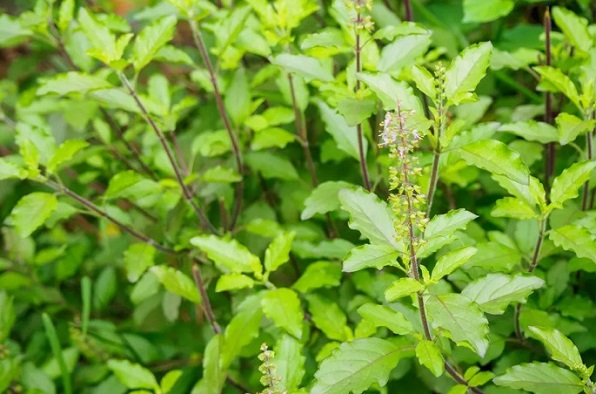Nikhil Prasad Fact checked by:Thailand Medical News Team Sep 07, 2025 5 months, 6 days, 23 hours, 55 minutes ago
Thailand Medical News: Ancient Herbs with Modern Promise
Researchers from “Grigore T Popa” University of Medicine and Pharmacy in Romania, “Ion Ionescu de la Brad” University of Life Sciences, and the “Olga Necrasov” Center of Anthropological and Biomedical Research of the Romanian Academy have uncovered promising evidence that two common herbs—sweet basil (Ocimum basilicum) and holy basil (Ocimum sanctum)—can protect the brain from devastating diseases like Alzheimer’s. This
Thailand Medical News report highlights how compounds in these plants could slow memory loss and prevent brain cell damage.
 Phytochemicals Found in Basil Can Shield the Brain from Alzheimer and Dementia
Why the Brain Needs Protection
Phytochemicals Found in Basil Can Shield the Brain from Alzheimer and Dementia
Why the Brain Needs Protection
Neurodegenerative diseases such as Alzheimer’s, Parkinson’s, and Huntington’s progressively destroy brain cells. They often begin with oxidative stress, a process where unstable molecules called free radicals overwhelm the body’s defenses, damaging proteins, DNA, and cell membranes. The brain is especially vulnerable because of its high oxygen demand and limited repair capacity. Current drugs for Alzheimer’s have limited impact, pushing scientists to search for natural plant compounds that act on multiple disease pathways at once.
What Basil Offers
Basil species are loaded with powerful bioactive compounds. Holy basil contains flavonoids, terpenoids, vitamins, and minerals that boost natural antioxidants like superoxide dismutase (SOD), catalase (CAT), and glutathione peroxidase (GPx). These help neutralize harmful free radicals and reduce lipid peroxidation—a damaging chain reaction in brain cell membranes. Sweet basil, rich in rosmarinic acid, linalool, and eugenol, has shown strong antioxidant and anti-inflammatory effects. In experimental studies, both plants reduced the toxic buildup of beta-amyloid plaques and tau protein tangles—two hallmarks of Alzheimer’s.
Evidence From Laboratory and Animal Studies
Animal studies revealed that holy basil extracts improved memory, reduced motor dysfunction, and even restored nerve cell density in brain regions damaged by chemicals mimicking Alzheimer’s. In rat models, the extracts also lowered amyloid levels and protected against cerebral ischemia by reducing infarct size and oxidative stress. Sweet basil extracts demonstrated similar benefits, improving memory and coordination in animals subjected to scopolamine, a drug that induces amnesia, while also reducing markers of brain oxidative damage.
Early Human Trials
Clinical studies, though still limited, suggest basil extracts may improve attention, reduce stress, and boost memory in healthy volunteers. For example, a placebo-controlled trial with Ocimum sanctum extract improved short-term memory and attention in participants after just four weeks. Other trials noted reduced stress, fatigue, and better sleep quality among users.
Importantly, these studies reported no serious side effects, pointing to basil extracts as safe for human use.
The Road Ahead
While findings are promising, researchers caution that more robust trials are needed. The precise molecular mechanisms—how each compound interacts with brain cells—are not fully understood. Scientists also stress the importance of testing standardized extracts in large groups of patients with diagnosed neurodegenerative diseases. Still, the growing body of evidence suggests that basil, a common kitchen herb, could one day form the basis of new therapies to fight Alzheimer’s and related brain conditions.
Conclusion
The study underscores that nature’s pantry may hold keys to protecting the brain. Sweet and holy basil, already valued in traditional medicine, are emerging as scientifically validated candidates in the battle against dementia. Their rich mix of antioxidants, essential oils, and flavonoids target multiple disease processes—from free radical damage to protein buildup. With further clinical research, these plants could complement or even improve current treatments, offering hope for millions worldwide facing Alzheimer’s and other neurodegenerative diseases.
The study findings were published in the peer reviewed journal: Nutrients
https://www.mdpi.com/2072-6643/17/17/2877
For the latest on Herbs and Phytochemicals, keep on logging to
Thailand Medical News.
Read Also:
https://www.thailandmedical.news/news/phytochemical-from-mulberry-shows-promise-against-alzheimer-disease
https://www.thailandmedical.news/news/thailand-doctors-discover-neuroprotective-power-of-indian-trumpet-tree-against-alzheimer-s-cell-damage
https://www.thailandmedical.news/news/pomegranate-seed-oil-shows-promise-in-slowing-down-memory-loss-in-early-alzheimer-patients
https://www.thailandmedical.news/articles/alzheimer,-dementia-
https://www.thailandmedical.news/articles/herbs-and-phytochemicals
